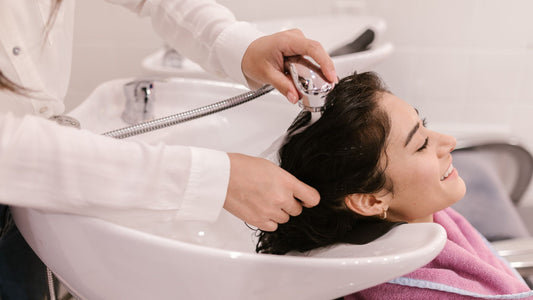
1. What is Oily Dandruff?
Oily dandruff is a type of dandruff caused by overactive sebaceous glands in the scalp, leading to excessive oil production. This oil traps dead skin cells, which then form greasy, yellow flakes. It differs from dry dandruff, which produces smaller, white flakes caused by a dry scalp.
2. Common Causes of Oily Dandruff
Understanding the underlying causes of oily dandruff can help in managing the condition more effectively. The following are the most common triggers:
- Overactive sebaceous glands: Excess sebum production leads to an oily scalp.
- Malassezia yeast: This yeast thrives in oily environments, aggravating dandruff symptoms.
- Hormonal imbalances: Hormonal changes can increase oil production in the scalp.
- Stress: High levels of stress can contribute to scalp issues, including oily dandruff.
3. Symptoms of Oily Dandruff
Recognizing the symptoms is the first step in treating oily dandruff:
- Greasy scalp: A shiny scalp caused by excess oil.
- Yellowish flakes: Unlike dry dandruff, oily dandruff flakes appear yellow and stick to the scalp.
- Itchy scalp: Irritation and itchiness are common symptoms.
- Scalp redness: Inflammation can occur due to irritation.
4. Natural Remedies for Oily Dandruff
Several natural remedies have shown effectiveness in controlling oily dandruff. These remedies can be incorporated into your routine alongside treatments and shampoos.
Tea Tree Oil
Tea tree oil has powerful antifungal and antimicrobial properties that help reduce dandruff-causing fungi. Add a few drops to your shampoo or massage it directly into your scalp, diluted with carrier oil.
Aloe Vera Gel
Aloe vera is known for its soothing and moisturizing properties. Apply pure aloe vera gel to your scalp to reduce irritation and control dandruff flakes.
Apple Cider Vinegar
Apple cider vinegar (ACV) balances the pH level of your scalp, helping to control excess oil and dandruff. Mix equal parts ACV and water, and use it as a rinse after shampooing.
Lemon Juice
Lemon juice contains citric acid, which helps break down oil and reduce dandruff. Massage fresh lemon juice onto your scalp and leave it on for 10-15 minutes before washing.
5. Oily Dandruff Treatments
If natural remedies are not enough to control oily dandruff, over-the-counter treatments and medications can be effective.
Anti-fungal Medications
Topical antifungal creams and shampoos containing ketoconazole can help to eliminate the yeast that causes dandruff.
Salicylic Acid
Salicylic acid helps exfoliate the scalp, removing dead skin cells and oil buildup. It is commonly found in dandruff shampoos.
Zinc Pyrithione
Zinc pyrithione is an ingredient that targets dandruff-causing fungi and reduces inflammation on the scalp.
6. Best Shampoos for Oily Dandruff
Choosing the right shampoo is crucial for controlling oily dandruff. Here are some top options:
Ketoconazole Shampoos
Ketoconazole is an antifungal ingredient found in many medicated shampoos. It targets the root cause of dandruff and prevents yeast overgrowth.
Salicylic Acid Shampoos
Shampoos with salicylic acid work by breaking down sebum and dead skin cells, providing relief from oily dandruff.
Zinc Pyrithione Shampoos
These shampoos reduce the production of oils and help keep dandruff-causing fungi in check.
7. How to Use Anti-Dandruff Shampoos Effectively
Using dandruff shampoo correctly is essential for results:
- Massage the shampoo into your scalp: Focus on the roots to remove excess oil and dandruff flakes.
- Leave it on for 5-10 minutes: Let the active ingredients work before rinsing.
- Use regularly: Consistent use of anti-dandruff shampoo 2-3 times a week can help prevent flare-ups.
8. Lifestyle Tips to Prevent Oily Dandruff
Certain lifestyle changes can reduce the occurrence of oily dandruff. Incorporating the following tips can help maintain a healthy scalp.
Diet and Nutrition
A balanced diet rich in omega-3 fatty acids, zinc, and vitamins B and D supports scalp health and helps control dandruff.
Hair Care Routine
Avoid using too many styling products, as they can build up on your scalp. Stick to a regular washing routine to prevent excess oil buildup.
9. DIY Hair Masks for Oily Dandruff
If you prefer homemade solutions, these hair masks can nourish the scalp and reduce oil production:
Yogurt and Honey Mask
Yogurt is packed with probiotics that can help balance the scalp's microbiome, while honey moisturizes and soothes. Apply the mixture to your scalp for 20 minutes and rinse off.
Coconut Oil and Lemon Mask
Coconut oil hydrates the scalp, while lemon's acidity helps control oil. Combine and apply to your scalp, leaving it on for 30 minutes before washing.
10. When to See a Dermatologist
If home remedies, treatments, and anti-dandruff shampoos are not effective, it may be time to consult a dermatologist. Persistent dandruff can sometimes signal an underlying condition like seborrheic dermatitis or psoriasis.







